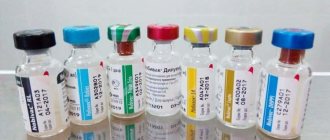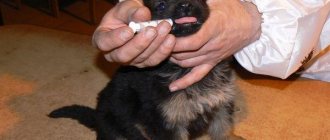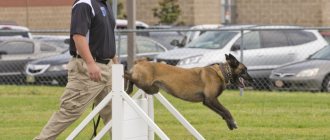Vaccination of puppies is the most effective way to protect against viral infections. The increased risk of death at a young age requires strict adherence to the vaccination schedule. Not only the buyer, but also the breeder should be familiar with the puppy vaccination schedule. It is he who is responsible for the first visit to the veterinarian.
Why do you need to vaccinate puppies and adult dogs?
Vaccination helps curb the spread of infections and reduce the epidemiological burden in cities. Vaccines are not drugs and are used solely for preventive purposes. A vaccinated pet is less likely to become infected. When infected, a mild course of the disease without complications is noted.
Vaccination is a prerequisite for traveling abroad, participating in exhibitions and mating with other animals. Regardless, having the procedure done too early in life is a bad idea. Before being separated from its mother, the four-legged baby receives passive immunity along with her milk. After breastfeeding, developing your own immune response does not always work, and then vaccination comes to the rescue.
Why you can’t vaccinate yourself
Vaccination of puppies is a fairly simple procedure. Despite this, veterinarians do not recommend doing it at home for the following reasons:
- Impossibility of obtaining a veterinary passport. This document is issued only by veterinary clinics that have undergone special accreditation. After self-manipulation, the animal will be protected from the disease, but will not be able to travel or participate in exhibitions.
- Possibility of complications. Help for an allergic reaction or anaphylactic shock will be provided faster in a clinic setting.
- Risk of violation of conditions for transportation, storage or use of the vaccine. At best, the desired effect will be lost, at worst, negative consequences will appear.
Before the procedure, it is recommended to undergo a complete examination by a doctor. This will exclude hidden diseases that are contraindications. After the vaccine is administered, the four-legged patient is under the supervision of veterinarians for some time. If his condition is stable, he is sent home.
Can a vaccine cause harm?
The puppy vaccine contains a dead or weakened virus. It is not dangerous for a healthy and strong body, but in a patient it can provoke the development of infection. Contraindications include:
- pathologies occurring in acute form;
- change of baby teeth;
- severe decline in immunity or exhaustion of the body caused by recent operations or illnesses;
- allergic reactions;
- lack of antiparasitic treatment;
- fever accompanied by high temperature;
- 2 weeks before and after tail or ear docking;
- estrus, pregnancy and feeding;
- 2 months before mating.
In all these cases, the body is too weak to fight foreign bodies. To exclude hidden pathologies, blood and urine tests are taken before the procedure.
What diseases are vaccinated against?
It is best to find out what vaccinations your dog needs and when they are recommended to be given by asking your veterinarian. The recommended list includes: rabies, distemper, enteritis, parainfluenza, leptospirosis and infectious hepatitis. The full list of required vaccinations depends on the epidemiological situation and differs by region. The listed diseases can be supplemented by lichen, adenovirus, piroplasmosis or Lyme disease.
Rabies
It doesn’t matter what vaccinations a puppy needs to have in your region - in Russia, rabies is always on the mandatory list. The virus is dangerous not only for animals, but also for humans. Unvaccinated dogs are prohibited from attending exhibitions and crossing the border. Some veterinary clinics refuse to accept unvaccinated pets due to the high risk of infection.
Plague
Canine distemper is characterized by rapid damage to the nervous system, followed by paralysis and cardiac arrest. Ask your doctor in advance when to give your puppy his first vaccination. Up to 3 months, the probability of death reaches 40-100%. Only timely adherence to the recommended schedule will help protect your beloved pet.
Enteritis
Another deadly pathology that threatens young animals and small breeds. Symptoms of enteritis include severe diarrhea and vomiting. Due to the resulting disturbances, the body rapidly becomes dehydrated and exhausted.
Parainfluenza
A viral disease that affects the upper respiratory tract. Accompanied by wheezing, whistling and pain in the sternum. It is especially dangerous for newborns, since with prolonged course it affects the intestinal system.
Leptospirosis
The disease is dangerous for humans - in dogs, cats and people it affects the kidneys, liver and gastrointestinal tract. The causative agent of the pathology is bacteria of the genus Leptospira. They are carried by wild animals and small rodents.
Infectious hepatitis
In young animals the disease occurs in an acute form, and in older animals it occurs in a chronic form. Infectious hepatitis is not dangerous for people, but is often fatal in unvaccinated pets.
Vaccination depending on age
When deciding at what age a puppy should get its first vaccination, the veterinarian takes into account individual characteristics and external factors. The general condition of the four-legged patient, conditions of detention and outbreaks of epidemics in the region of residence are taken into account.
First vaccination
Most often, the first vaccination is given to a puppy at 6-7 weeks. At this age, passive immunity received from the mother gradually fades away.
An upward shift in the date is possible with a small litter and an abundant amount of milk in a nursing dog. Postponement of the procedure to an earlier date is explained by early separation from the mother, crowded housing, an imminent change of residence, or an outbreak of an epidemic. In these cases, the Puppy series puppy vaccine, developed specifically for the child’s body, is used.
Second and third vaccinations
The second vaccination is given at 7-8 weeks, the third vaccination is usually complex and includes rabies, it is given at 12 weeks. This period is explained by the low probability of infection of the baby through the main carriers of infection.
In addition to a schedule that takes into account specific diseases, it is important not to forget about revaccination (re-administration of the vaccine). It is carried out 3-4 weeks after the main one to consolidate the result and increase the volume of antibodies.
Vaccination schedule up to a year
Another danger of self-vaccination is explained by an individual approach when drawing up a schedule. Recommended regimens differ even among animals born from the same mother. In addition, the regimen may vary depending on the type of vaccine, especially if they are complex.
What vaccinations are given to puppies up to one year old, using the table as an example:
| Disease | Duration of first vaccination (month) | Revaccination period |
| Rabies | 3-4 | – |
| Plague | 2,5 | 21-28 days |
| Enteritis | 2-2,5 | 21-28 days |
| Parainfluenza | 2-2,5 | 21-28 days |
| Leptospirosis | 2-2,5 | 21-28 days |
| Infectious hepatitis | 2-2,5 | 21-28 days |
Note: the table is approximate, only the veterinarian can determine the exact dates!
Vaccination against other diseases and schedule shifts are agreed upon with the doctor. Carrying out the procedure too early will lead to a collision with passive immunity transmitted through breast milk. In this case, the body will remain vulnerable because it will not be able to create its own antibodies.
Revaccination of adults
The second revaccination occurs at 1 year of age, when the animal is recognized as an adult. It is pointless to get acquainted with what vaccinations are given to dogs by age using the table as an example. The principle of drawing up a schedule is similar, so it is better to ask your doctor all questions.
After 1 year, all further revaccinations are carried out no more than once a year. Exceptions include animals with chronic diseases and weakened immune systems. They are vaccinated every 3 years.
Veterinarians recommend observing seasonality. It is easier to cope with pathogenic infections in summer and winter, since heat and cold effectively kill bacteria and viruses.
Features of vaccination depending on breed
Breed does not affect the vaccination order. The dosage of the drug is standard for all breeds. Increasing or decreasing the recommended dose may result in a lack of effect or the development of complications.
Exceptions include breeds at risk. But even in this case, all changes are discussed with the veterinarian.
Types of modern vaccines
When choosing a vaccine for puppies, take into account the place of its production and the breadth of its application. These indicators affect the final price, so it is necessary to understand their main differences.
What to choose: domestic or imported product?
Domestic products are always cheaper than foreign analogues. The main advantage of imported samples is their longer existence and a large number of positive reviews. Veterinarians recommend choosing a domestic manufacturer when vaccinating against rabies. After the use of foreign drugs, outbreaks of diseases were recorded.
Mono-vaccines
Single vaccines are aimed at preventing one disease. Their advantage lies in a more gentle effect on the body and better production of antibodies to the selected infection.
When vaccinated with mono-vaccines, it is easier to choose an individual schedule, but the pet will have to undergo many injections. If your four-legged pet experiences stress when visiting a veterinary clinic or you have too little free time, use polyvaccines.
Polyvaccines
Polyvaccines include up to 6-7 fragments of different viral codes. They are more difficult to tolerate by the body, so multicomponent formulations are indicated only for adult animals. For children, drugs containing up to 4 different viruses are used.
The disadvantage of polyvaccines is the possible suppression of some antibodies by others. The rabies virus is considered the most aggressive, so the body directs all its forces to fight this particular agent. In other cases, immunity to several diseases is achieved simultaneously with just one injection.
Effect of the vaccine on the body
When dead or weakened fragments of the viral code are introduced into the body, active production of T-lymphocytes begins - antibodies responsible for destroying the invading pathogen. These antibodies are called memory cells, so if successful, they remember the method of fighting the infection. In case of infection, they give an immediate response, preventing further spread of the virus.
This method of combating infectious diseases is used only for preventive purposes. In case of direct infection, the infected animal is injected with serum - a preparation with ready-made antibodies that forms short-term passive immunity.
Vaccines for dogs: which are best?
Vaccines for dogs can be divided into two groups: inactivated (“dead” vaccines) and attenuated (“live” vaccines). Attenuated vaccines include weakened modified live viruses, which, when entering the puppy’s body, begin to actively multiply and stimulate it to develop its own immunity. In fact, the puppy suffers from the disease in a very mild form. The advantage of this vaccine is that it is enough to introduce a very small number of viral cells, which subsequently themselves reach the required number. Immunity from a “live” vaccine develops much faster and lasts longer. One such vaccine can develop immunity within one week and maintain it for more than 3 years. Which vaccine for dogs is still better?
With inactivated vaccines the situation is a little different. A larger number of virus cells are required for administration, immunity is formed much more slowly, and the effect of the vaccine is limited to several months. To form stable immunity, you need at least two vaccinations with an inactivated vaccine with an interval of 3 weeks.
The only exception is the inactivated rabies vaccine, which after the second application provides stable immunity to the disease throughout the dog’s life.
What types of vaccines are there?
Different types of vaccines protect against different pathogens, and in order to accurately determine what exactly a particular drug is against, they are marked with specific symbols. Here's a quick overview of the main meanings:
- L - Leptospirosis = canine leptospirosis
- P - Parvovirus enteritis = canine parvovirus enteritis
- D - Distemper = canine distemper
- R - Rabies = dog rabies
- L. jcterohaemorrhagiae, L. canicola, L. pomona, L. Grippotiphosa
- H - Hepatitis infectiosa = Rubart's hepatitis
- PI2-Parainfluenza + Bordetella bronchiceptica = canine parainfluenza
What diseases are they protected from?
Today, veterinary medicine has stepped far forward and is able to cure many ailments of our four-legged pets. But there is a list of diseases against which only vaccination is effective. Here is a sample list of such ailments:
- Distemper (or canine plague);
- Rabies;
- Parainfluenza (as well as adenoviruses);
- Leptospirosis;
- Infectious hepatitis;
- Parvovirus enteritis;
If you do not vaccinate your puppy against these diseases in time, then most likely, if infected with any of these pathogens, your dog will either die or become very seriously ill, which will cause enormous, sometimes irreparable harm to the body.
Monovalent vaccines
Vaccines are also divided depending on their composition into monovalent and complex. Monovalent vaccines that create resistance to a specific disease in a puppy have a number of advantages.
- Firstly, vaccination with such a drug reduces the load on the immune system and the entire body as a whole.
- Secondly, the quality of the immune response also improves, since viruses do not need to fight for habitat. For example, parvovirus and coronavirus enteritis viruses will compete due to the fact that they will reproduce in the same place. And the canine distemper virus is generally the most aggressive and can suppress any other vaccine.
- Thirdly, with the use of monovalent vaccines, the veterinarian can select an individual immunization regimen that is suitable for your puppy. And among all the vaccines provided, you can choose the best one against each specific disease.
- Fourthly, the solvent for monovalent vaccines is usually chosen independently, and in this case it would be better to choose sterile water, when for complex vaccines the dry part of the vaccine is usually diluted in a liquid one.
Complex vaccines
Polyvalent or complex vaccines build immunity in a puppy to several diseases simultaneously. These vaccines consist of a complex of antigens. They are much better tolerated by adult dogs, as they affect previously acquired immunity, and in a puppy they can cause a number of side effects. However, these vaccines have their advantage: with one injection you can vaccinate your dog against several diseases at once, which will save you and your pet from further trips to the clinic and stress. At the moment, the quantitative limit in the composition of complex vaccines has been reached. Polyvalent vaccines should contain up to 6-7 varieties of virus strains as much as possible, since only in such a combination an effective immune response of the whole organism is guaranteed.
Thus, almost all vaccines have a prolonged effect and form long-term active immunity in the puppy. At the moment, there is a huge selection of monovalent and complex vaccines of domestic production and their foreign analogues.
Domestic vaccines for dogs (table)
| Name | For what purpose? | Price |
| Live vaccines Biovac (production: Biocenter). |
| 150-200r |
| Dipentavak (production: Veterinary Animal Center). | This complex vaccine is used against parvovirus enteritis, infectious hepatitis, adenovirosis, and leptospirosis in dogs. | 250rub |
| Hexakanivac (production: Veterinary Animal Center). | This complex vaccine consists of the liquid part of the vaccine against infectious hepatitis, parvovirus enteritis and leptospirosis of dogs with the addition of the dry part of the live vaccine against canine distemper. | 150-250r |
| Polivak-TM (production: NPO Narvak). | Polyvalent vaccine against dermatomycosis. This complex vaccine contains eight types of inactivated strains of fungi such as Trichophyton and Microsporum. | 50-100r |
| Multikan (production: NPO Narvak). | This complex vaccine is used to build the dog’s body’s resistance to plague, adenovirus infections, parvovirus and coronavirus enteritis, leptospirosis and rabies. Several varieties of the Multikan vaccine are produced:
| 100-200r |
| Asterion (production: NPO Narvak). | This complex vaccine prevents diseases such as plague, adenovirus infections, parvovirus enteritis, parainfluenza, and canine leptospirosis. Several varieties of the Asterion vaccine are produced:
| 150-200r |
| Vladivak-ChPAG (production: Bionit Group of Companies) | This complex vaccine prevents diseases such as plague, parvovirus enteritis, adenovirus infections and infectious hepatitis of dogs. | 35-50r |
Imported vaccines for dogs (table)
| Name | For what purpose? | Price |
| Nobivak (manufactured by: Intervet International BV, Holland). | They produce several varieties of the Nobivak vaccine: Nobivac Puppy DP - against plague and parvovirus enteritis (the only vaccine developed specifically for the fragile body of a puppy 3-6 weeks old);
(Interpretation of symbols: D – plague; H – hepatitis, adenovirus; P – parvovirus infection; Pi – parainfluenza; L – leptospirosis; R – rabies). | 80-700rub |
| Hexadog (production: Merial (Merial S.A.S., France). | Polyvalent vaccine against plague virus, adenovirus, parvovirus, leptospirosis and rabies. This vaccine forms active immunity in the animal within 14-18 days. It is well tolerated. It is recommended to revaccinate your dog annually. | 450-550r |
| Eurican (production: Merial (Merial S.A.S., France). | There are two types of Eurikan vaccine: Eurikan DHPPI2-L - against plague, adenovirus, parvovirosis, parainfluenza type 2 and leptospirosis; Eurican DHPPI2-LR – against plague, adenovirus, parvovirus, parainfluenza type 2, leptospirosis and rabies. | 350-500r |
| Rabisin (production: Merial (Merial S.A.S., France). | A monovalent vaccine, which is well tolerated, provides stable active immunity to the rabies virus for 12 months, annual revaccination is recommended, and is not compatible with other drugs. | 100-150r |
| Primodog (production: Merial (Merial S.A.S., France). | A monovalent vaccine that forms active immunity to canine parvovirus enteritis, can be used together with two vaccines and Hexadog, the drug is not compatible with other vaccines, use is recommended from 8 weeks of age. | 300-400r |
| Duramune (produced by: Fort Dodge Animal Health, Mexico) | Fort Dodge Animal Health produces a wide range of monovalent and complex Duramune vaccines, the most popular of which are: Duramune Max 5-CvK/4L - against plague, adenovirus, parvovirus (type CPV-2b), coronavirus infection, parainfluenza, leptospirosis; Duramune Puppyshot Booster – against plague, adenovirus, parvovirus (type CPV-2b, type CPV-2a), coronavirus infection, parainfluenza, leptospirosis; Duramune L – against leptospirosis. | 300-500r |
| Vanguard (manufactured by Pfizer, USA) | A comprehensive vaccine against distemper, infectious hepatitis, respiratory disease caused by adenovirus type II (CAV-II), parainfluenza, canine parvovirus enteritis and leptospirosis. The manufacturer emphasizes that only dog cell cultures are used in the development of the vaccine. It should be noted that the body’s enhanced immune response to the Vanguard vaccine is achieved due to the use of a fairly aggressive strain of the Snyder Hill canine distemper virus. Therefore, this drug should be used with extreme caution. Cannot be used on pregnant dogs. | 150-200r |
| Defensor 3 (manufactured by Pfizer, USA). | A monovalent vaccine that forms active immunity to rabies in dogs. Can be used from the age of 1 year. Annual revaccination is recommended. | 75-150r |
As can be seen from the table, the wide range of vaccines on the Russian market competes well with imported analogues. The general rule for choosing a vaccine is one: you need to carefully check the expiration date and storage conditions of the vaccine, as well as the conditions of its transportation (relevant for foreign vaccines). This is due to the fact that, depending on the type of vaccine, it may use live antibodies, which die under improper transportation conditions. However, consumers often have greater confidence in foreign veterinary drugs, since their prices are noticeably higher, and, therefore, the quality should be better.
But price should not always be the key factor in choosing a vaccine for a dog.
For example, it is recommended to vaccinate puppies against canine distemper only with Russian-made vaccines (Vakchum, 668-KF or EPM). There have been many cases of dog distemper reported in the country after vaccination with foreign drugs.
In any case, before vaccination, you must discuss all the details with a qualified veterinarian, who should tell you about all the advantages and disadvantages of available vaccines and adjust their prescription based on disease statistics in a particular area.
How does the procedure work?
To avoid complications, it is recommended to follow the recommendations for preparation for the procedure and mandatory quarantine after it. In this case, you do not have to worry about the health of your four-legged pet.
Preparation at home
Preparation begins 2 weeks before the event. The owner needs:
- Make sure there are no diseases. Check your temperature and stool quality daily. If alarming signs occur, contact your veterinarian.
- Maintain your usual diet. The change is expected only on the immediate day of vaccination. If the procedure is scheduled for the morning, refuse feeding. In the case of an evening recording, reduce the usual portion by ½ with natural feeding and by ⅓ with dry feeding. The last feeding should be no later than 4 hours before vaccination.
- Treat your pet against helminths, ticks and fleas. If infected with parasites, the vaccination period is shifted, and the pet is treated again.
Before the first vaccination, walks and contact with people dressed in outerwear are excluded. An unvaccinated baby should be next to his mother, away from the corridor with street shoes. For preventative purposes, regularly carry out wet cleaning and wash your shoes after going outside.
Choosing a veterinary clinic
Choose an institution that has received a special license to carry out veterinary activities. This guarantees the safety of the services provided.
The procedure can be performed directly in the clinic or at home. The advantage of the first option is a wide selection of equipment needed for complications and the absence of the risk of damage to the drug during transportation. The second option minimizes the stress factor and eliminates the transmission of infection from other four-legged patients.
Vaccine introduction
Typically, the most painful part of the procedure is the needle piercing the skin and/or muscle. The injection itself does not cause pain, so most dogs tolerate the injection calmly.
If a puppy is being vaccinated, it is enough to hold it firmly in your arms. You can wrap a particularly active baby in a towel. But an adult dog of any breed must be muzzled. Even very calm individuals who are not receiving an injection for the first time can become nervous and bite the doctor or owner. Therefore, follow all the rules for visiting the clinic: short leash, muzzle, and sometimes you will need an assistant.
Dangerous and non-dangerous side effects
Due to the activation of protective mechanisms, a temporary decrease in immunity occurs, causing a number of side effects. Non-hazardous ones include:
- one-time vomiting or diarrhea;
- lethargy and fever (not higher than 39.5 ° C) during the first 3 days;
- loss of appetite (fasting is permissible for no more than a day);
- pain accompanied by barking and whining, or temporary lameness (no more than 4 days);
- the formation of a lump at the injection site, which disappears on its own within a month.
If a month has already passed and the lump has still not resolved, contact your veterinarian. This phenomenon is typical for a benign tumor. Surgery is used to remove it.
Mandatory assistance from a veterinarian must be sought in case of progressive deterioration of the condition, growth and suppuration of the lump, as well as the development of anaphylaxis (allergy). An allergic reaction is accompanied by swelling and discoloration of the mucous membranes, profuse salivation and difficulty breathing. If these symptoms appear, give the animal an antihistamine and call a doctor immediately.
Cost of vaccine and clinic services
The final price depends on the chosen manufacturer and location of vaccination. Foreign drugs and calling a doctor to your home will cost the most. The most popular vaccines include:
- French Eurican;
- Dutch Nobivak;
- American Vanguard;
- Russian Polivac and Multikan.
The clinic’s services include not only the procedure itself and consumables, but also a preliminary conversation with a therapist. Prices vary greatly by city and region, so it is better to call the clinics yourself and compare the cost of services.
Puppy vaccination: when to vaccinate puppies
The first puppy vaccination should be given to the puppy at the age of 2 months. Until this time, it is not recommended to take the puppy outside or walk with him in open areas , especially since his communication with other dogs is prohibited. Another nuance is that you should carefully ensure that the puppy does not get sick with any colds or infectious diseases.
What do puppy vaccination rules include: how to prepare a dog for vaccination
Let's take a closer look at the rules that must be followed when preparing your two-month-old puppy for vaccination.
. So, when the vaccination date has already been set and circled on the calendar, you should do the following.
- Deworm the puppy . For this you can always use any anthelmintic drug. Fortunately, the choice of such veterinary drugs today is greater than ever and comes in a wide range. It is also easy to purchase them at any veterinary pharmacy or veterinary clinic. The purchased drug will need to be poured into the puppy’s mouth using a syringe, using it about sixty minutes before morning feeding. Repeat the procedure after one day.
- Remember the most important thing: you can only vaccinate an animal when it’s healthy ! Ah, not when it is sick with something or has a cold. In this case, you will need to wait until it completely comes to its senses, that is, it will be healthy again.
Is it necessary to deworm the animal before the second vaccination?
Yes, without a doubt.
Deworming is necessary
every time
you take your animal for vaccination. Otherwise, why do it? After all, if the animal’s body is not properly prepared for it, then the whole procedure will go down the drain. It is also not worth feeding the puppy in anticipation of vaccination; it is best if it is done in the morning on an empty stomach. But, water can be given to an animal without any restrictions.
In the event that puppy vaccination
prescribed by the veterinarian
for the second half of the day
, then you can
feed the puppy
, but in advance, namely somewhere
2, or even 3 hours in advance.
The only thing is, if you are used to feeding your puppy natural food, then make an exception and
feed him something more nutritious.
Oh, it’s not worth reminding that no heavy products are needed here.
If it is already time for your pet to be vaccinated , then you can always contact our veterinary clinic for help. Our YA-VET specialists will provide all the necessary assistance, tell you what vaccinations, when and at what age will still need to be done, conduct a routine examination of the animal, and explain many related issues. You can certainly trust your dog to our specialists.
By the way, our veterinary center provides a service to call a veterinarian at home. This approach will help make your pet's puppy life much easier. Moreover, calling a veterinarian at home is always reliable and convenient.
The table shows the prices of our veterinary services center for basic vaccinations for puppies:
| Service | Price, rub |
| Vaccination of a puppy with a 5-valent domestic vaccine (Polivak, Dipentavak, etc.) – 5 infections (from 2 months) | from 600 |
| Vaccination of a puppy with a 5-valent foreign vaccine (Nobivak, Eurikan, etc.) – infections (from 2 months) | from 800 |
| Vaccination of a puppy against rabies with a domestic vaccine - Rabikan, etc. (from 3 months) | from 400 |
| Vaccination of a puppy against rabies with a foreign vaccine - Nobivak Rabies, Defensor, etc. (from 3 months) | from 500 |
| Complex vaccination of a puppy with a domestic vaccine | from 800 |
| Complex vaccination of a puppy with a foreign vaccine | from 1000 |
In addition, do not forget that the topic of puppy vaccination is the most important and complex in the field of dog breeding, which cannot be avoided. Such vaccinations are carried out not only in Russia, but also abroad. If you wish your little miracle good health for years to come, you still have to do it.
But after it, your dog will have immunity, and this is the most valuable and expensive thing! Is not it?
How are puppies vaccinated?
Vaccinate the animal, especially for the first time, in several stages
.
- Initially, the animal is given the first injection, after seven to fourteen days the second injection is given. Only in this order.
- After all of the puppy's baby teeth have been completely replaced, the vaccination should be repeated. A puppy's baby teeth change between four and six months of age.
- Further vaccination is carried out at the age of one year.
- Afterwards, the animal must be vaccinated annually.
As for bitches, there is a separate condition. They, undoubtedly, will also need to be vaccinated annually, but without fail one month before the intended mating or estrus. Here are the vaccinations your animal will need to have. The vaccination itself, after examining the animal, is given by the veterinarian to the thigh or to the scruff of the neck. After each vaccination performed, it will be necessary to make an entry in the veterinary passport.
Recovery after vaccination
Quarantine lasts 2 weeks after the procedure. For the safety of your four-legged pet, it is necessary to exclude contact with the outside world, ensure a comfortable environment inside the house and reduce physical activity.
On the first day there is a slight increase in temperature. It will go away on its own after a couple of days.
When can you go for a walk?
It is recommended to walk your pet only on the 4th day after revaccination. In this case, the likelihood of infection from other animals is minimal. If you are vaccinated for the first time, you will have to stay at home for the entire quarantine, that is, 28 days.
When can you bathe a puppy?
Weak immunity is vulnerable to colds, so any draft can end in tragedy. Avoid swimming for 4 days after the injection.
Feeding during quarantine
When feeding, it is recommended to stick to your usual diet. The introduction of new products is fraught with an allergic reaction. If the animal refuses to eat, there is no need to force feed it - it is better to wait until the appetite awakens.
Care after vaccination
During the day after vaccination, you need to monitor your pet's condition. He may be lethargic, refuse to feed, and diarrhea and vomiting are possible once. The main thing is to monitor the possible occurrence of an allergic reaction. Swelling in the face, drooling, difficulty breathing are reasons to urgently contact a veterinarian.
General recommendations:
- treatment against fleas, ticks and helminths should be postponed for 14 days;
- do not expose the animal to stress:
- do not change living conditions,
- do not change food,
- do not expose to overheating or hypothermia,
- postpone performances at exhibitions and competitions;
- Do not bathe your pet; it is permissible to wash only the paws, belly, and face.
- A lump may form at the injection site. Normally, it can resolve within three months. If the lump grows, turns red, or itches, it is recommended to consult a doctor.
What to do if vaccination is missed
Violation of the recommended schedule leads to a decrease in the effectiveness of the vaccine. Actions in case of absence depend on the amount of time missed. If more than 1.5 years have passed since the last vaccination, then a double injection is required, as for the first time. In other cases, the vaccine is administered as soon as possible, adjusting the original schedule.
Neglecting routine vaccinations for your puppy and adult dog puts not only other animals, but also people at risk.
Despite many controversies surrounding the advisability of vaccination, 90% of vaccinated dogs avoid infections. The remaining 10% experience a mild course, but still avoid death. The article is for informational purposes only. Contact your veterinarian!
Rules for rabies vaccination of dogs
Considering the danger of the disease to humans, all rules for rabies vaccination of dogs are also enshrined in law. In particular, it is a mandatory requirement to include information about vaccinations in the dog’s veterinary passport. Without these marks, the owner will not be able to show his pet at exhibitions, he will not be allowed through customs (and there is a risk of confiscation of an unvaccinated dog with its subsequent forced vaccination), etc.
Interesting! In some countries, a dog's failure to have rabies vaccinations is grounds for criminal prosecution of the owner. In a word, everything is very serious, and therefore you cannot forget about this vaccination under any circumstances.











